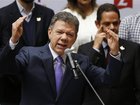President Barack Obama met his Cuban counterpart Raul Castro on Tuesday at the United Nations -- all smiles after both renewed their calls for an end to the U.S. trade embargo against Havana.
The leaders of the former Cold War rivals shook hands at the start of what was their second meeting, after an historic encounter in April at the Summit of the Americas in Panama.
 Full Story
Full Story
President Barack Obama on Monday called for ending the decades-old U.S. embargo on Cuba, in his address to the U.N. General Assembly.
Obama said he was confident that the U.S. Congress will "inevitably lift an embargo that should not be in place anymore," drawing applause from the 193-nation assembly.
 Full Story
Full Story
U.S. President Barack Obama will hold talks with Cuban leader Raul Castro on Tuesday on the sidelines of the U.N. General Assembly in New York, the White House said Sunday.
It will be the second meeting between the two leaders, after a first historic encounter in Panama in April.
 Full Story
Full Story
Cuban President Raul Castro on Saturday took aim at the U.S. embargo against his country, describing it as the "main obstacle" to his country's economic development.
"Such a policy is rejected by 188 United Nations member-states that demand its removal," Castro told a U.N. development summit, referring to a U.N. resolution calling for the end of the decades-old embargo.
 Full Story
Full Story
Colombian President Juan Manuel Santos and the leader of the country's largest rebel group announced on Wednesday an important breakthrough in peace talks that sets the stage to end Latin America's longest-running armed conflict.
In a joint statement from Cuba, Santos and the Revolutionary Armed Forces of Colombia said they have overcome the last significant obstacle to a peace deal by settling on a formula to punish belligerents for human rights abuses committed during a half century of bloody, drug-fueled fighting.
 Full Story
Full Story
Colombia's president and the head of the FARC rebel group were due to meet in Cuba on Wednesday in a push to seal a peace accord and end a half-century guerrilla war.
After nearly three years of stop-and-start peace talks in Havana between the Bogota government and the Revolutionary Armed Forces of Colombia (FARC), President Juan Manuel Santos announced the surprise trip on Twitter, saying: "Peace is near."
 Full Story
Full Story
Pope Francis left Cuba Tuesday for his first-ever visit to the United States, where he may get a slightly chillier reception in some quarters than on the Caribbean island.
The pope, who played a key role in brokering the recent rapprochement between the Cold War foes, flew out of Cuba's second city Santiago on the same Alitalia plane that brought him from Rome.
 Full Story
Full Story
Pope Francis delivered mass Tuesday in the Cuban city of Santiago, cradle of the communist island's 1959 revolution, calling for a new kind of "revolution": one of "reconciliation."
The pope, who sets off later Tuesday for his first-ever visit to the United States, delivered the last mass of the Cuban leg of his trip at a basilica to Our Lady of Charity of El Cobre, the island's patron saint -- a mixed-race Mary that symbolizes its intertwined Spanish and African roots.
 Full Story
Full Story
Cubans from Guantanamo province said Monday they hope Pope Francis' visit to Cuba will help bring an end to the U.S. naval base and detention center at Guantanamo Bay.
Hundreds of residents of Guantanamo city and the eastern province of the same name made the nine-hour bus trip to Holguin to attend the pope's mass here Monday, the third day of an eight-day trip that will take Francis to both Cuba and the United States.
 Full Story
Full Story
Pope Francis arrived Monday in Holguin in eastern Cuba, a cradle of Catholic faith on the island and also the home region of communist leaders Fidel and Raul Castro.
The pope was welcomed at the airport by Holguin's Bishop Emilio Aranguren and the Cuban government's number two official, Miguel Diaz-Canel, as a large crowd shouted, "Francis our friend, the people are with you!"
 Full Story
Full Story



